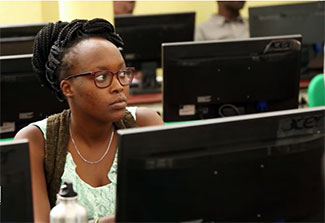Unique methods needed to train African data scientists
September / October 2020 | Volume 19, Number 5
By Susan Scutti
When capacity building came under the microscope at the
Harnessing Data Science for Health Discovery and Innovation in Africa (DS-I Africa) conference, discussants agreed more educational opportunities are needed. While demand for data science degrees is great, the supply of qualified teachers is lacking, according to the University of Rwanda’s Dr. Ignace Kabano. The discipline is “a blend of mathematics, statistics and computer science, yet most lecturers have expertise in just one of these fields,” he noted. Rare is the expert equipped with skills related to data manipulation and data capture who also has the statistical chops to analyze big data. Kabano also suggested Africa’s data science programs should seek accreditation by the Data Science Council of America to achieve global parity.

Photo courtesy of the African Centre of Excellence in
Data Science
Student Gloria Biwott of Kenya attends class at The African
Centre of Excellence in Data Science based in University of
Rwanda School of Economics.
A well-rounded data science education includes theoretical training for the development of research skills and “real world” problem-solving, said Dr. Mahadia Tunga, of the Tanzania Data Lab. In 2018, Tunga’s team partnered with the University of Dar es Salaam to design a master’s program in data science. For their capstone projects, students work directly with NGOs to identify and solve data challenges. Data science training also needs to address and promote inclusion, Tunga proposed. Since fewer than 30% of her participants are female, she is targeting women early in their careers for skill development and matching them with appropriate mentors to encourage them to stay in the field.
“This program bridges them into a managerial or decision-making position,” said Tunga, explaining that the idea is to move beyond simply including women; instead, she hopes to position them “to be felt in an organization.” Finally, an annual Women in Data Science Conference also supports, encourages and inspires the current and future generations.
Other panelists agreed that learning opportunities need not be relegated to the classroom. Dr. Amel Ghouila, a bioinformatician who has spent the last six years within the NIH’s
Human Heredity and Health in Africa program (H3Africa), believes alternative forms of teaching are beneficial supplements to traditional approaches. She has provided customary training activities, including in-person and online bioinformatics sessions and courses, while her H3ABioNet team (an infrastructure program for H3Africa) runs train-the-trainer courses to “keep the ball rolling” with instructors from different regions. Along the same theme but in an alternative vein, she recently launched “learning circles,” where classroom members and students in the same region are encouraged to continue meeting and sharing skills once the Introduction to Bioinformatics online course ends.
In 2018, her team collaborated with Mozilla Foundation and Sage BioNetworks to organize the East Africa Open Science tour, which ran workshops in Sudan, Ethiopia, Kenya, and Uganda. The tour’s agenda included a discussion about how to make the research workflow reproducible and why it needed to be so, and “we also spent a lot of time talking about data sharing, code sharing, and incentives,” said Ghouila. For each stop in the four-country tour, the organizers adjusted the curriculum, she noted: “We sort of had it be more interactive and adapted to the needs in each location.” Her team also hosts round table discussions for students to collectively examine the potential benefits of open science.
Ghouila also helped organize a crowdsourcing event for a DREAM challenge. In September 2016, scientists from across the African continent gathered in Johannesburg to prepare a dataset for use in the Malaria DREAM Challenge, a project intended to discover drug resistance. Participants, who arrived from universities as well as private companies, included data scientists, biostatisticians, biologists, and malaria experts. “At the end of the hackathon, we tried to do a skills-gain assessment and it was really very good to see that it was a very good peer learning exercise,” said Ghouila.
The power of groups is not lost on Dr. Jeremie Zoueu, a professor at the National Polytechnic Institute Ivory Coast and coordinator of the African Spectral Imaging Network (AFSIN). He quoted AFSIN’s mission statement “to do high level science, to identify and train talented students, and to apply our scientific expertise and experience to value societal concern, including public health issues.” In meeting its goals, the network has trained more than 100 masters and 30 PhD students in biomedical optics.
“We have also designed and constructed biomedical diagnosis tools to tackle a number of tropical diseases such as malaria and Buruli ulcer,” said Zoueu. These are not simple tools, he explained; each student-designed instrument incorporates characteristics of machine learning, optical technologies and data science. How has AFSIN built these diagnostic tools - and equipped numerous African laboratories? By taking full advantage of continental workshops. “Generally, once a year, we bring together students and younger staff members in one of the participating countries for training,” said Zoueu. “During these workshops, we usually build an instrument. And after the workshop, that instrument is used for both research and problem solving in the student's home country.”
More Information
To view Adobe PDF files,
download current, free accessible plug-ins from Adobe's website.
Related Fogarty Programs
Related World Regions / Countries